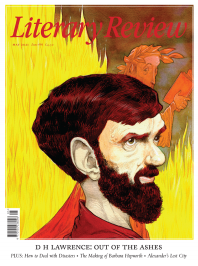Donald Rayfield
Eau de Hammer & Sickle
The Scent of Empires: Chanel No. 5 and Red Moscow
By Karl Schlögel (Translated from German by Jessica Spengler)
Polity 220pp £20
Most historians of Russia present us with what they saw and heard; Karl Schlögel, however, tells us what he smelled. Olfactory impressions can be deeper and longer than those left by the other senses, although they are not easy to convey (unless you use a sachet instead of a book). If you had taken a blind, deaf visitor just a hundred yards from Checkpoint Charlie into the Soviet sector of Berlin, he or she would instantly have been struck by the stench of mercaptan (a knockout gas that smells like boiled cabbage) in car exhaust fumes, the smell of sour milk from workplace canteens, the synthetic cherry smell of the wax on the floors, and the pungent crowds, whose body odours, not blocked by deodorants, created a heady atmosphere.
In this wide-ranging but concise study, just as in his Moscow 1937, a very original survey of the USSR during the Great Terror, Schlögel deals with subjects that are parallel and peripheral to his main theme, which is French and Russian perfume-making. The story begins with Ernest Beaux, a perfumer to the Russian court, fleeing back to his native France after the revolution and adapting his Catherine the Great perfume for Coco Chanel. In the 1920s and 1930s, as the Soviet elite gave up proletarian dress for Western fashions, Chanel’s perfumes found their way back to Russia.
Coco Chanel was a ruthless collaborator with Nazism, trying with German help to appropriate her Jewish business partners’ share in the Chanel enterprise (only her connections with British political elites saved her from prosecution after the war). In Russia she had a counterpart in the ruthlessly doctrinaire Jewish communist Polina

Sign Up to our newsletter
Receive free articles, highlights from the archive, news, details of prizes, and much more.@Lit_Review
Follow Literary Review on Twitter
Twitter Feed
Few writers have been so eagerly mythologised as Katherine Mansfield. The short, brilliant life, the doomed love affairs, the sickly genius have together blurred the woman behind the work.
Sophie Oliver looks to Mansfield's stories for answers.
Sophie Oliver - Restless Soul
Sophie Oliver: Restless Soul - Katherine Mansfield: A Hidden Life by Gerri Kimber
literaryreview.co.uk
Literary Review is seeking an editorial intern.
Though Jean-Michel Basquiat was a sensation in his lifetime, it was thirty years after his death that one of his pieces fetched a record price of $110.5 million.
Stephen Smith explores the artist's starry afterlife.
Stephen Smith - Paint Fast, Die Young
Stephen Smith: Paint Fast, Die Young - Jean-Michel Basquiat: The Making of an Icon by Doug Woodham
literaryreview.co.uk